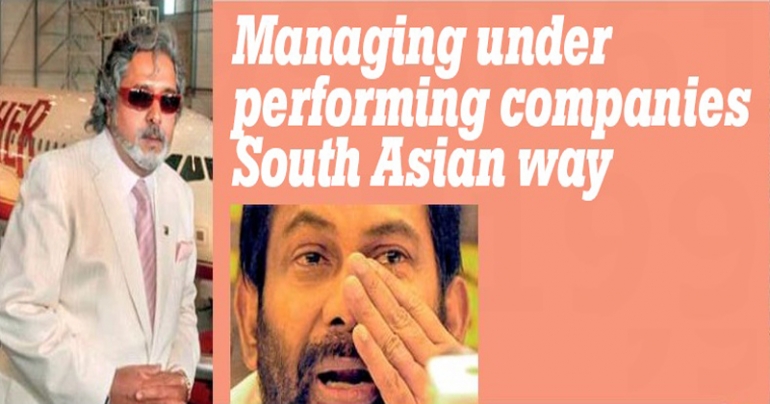The Kingfisher story stinks of a game played by the corporate sector in the West; they topple and expect a bail out from taxpayer’s money.
It was reported in the Hindu News Paper, Business Line that “After flailing its wings about in the last fortnight trying to keep flying, Kingfisher Airlines, plagued by a liquidity crisis, has now landed in Rajpath seeking government help. The Civil Aviation Minister, Mr. Vayalar Ravi, is reported to have spoken to the Finance Minister, Mr. Pranab Mukherjee, recommending help to the beleaguered airline. The Prime Minister, Dr. Manmohan Singh, has said that the government would explore ‘ways and means' to help the airline.
Kingfisher was seeking Rs. 300 crore of further assistance from banks and a similar amount in the form of Letters of Credit and bank guarantees. Only in January this year, the airline was rescued with a debt restructuring package that converted a third of its loans to equity, extended the tenure of the balance, allowed a repayment moratorium for two years and reduced interest rates on the outstanding loans.”
The Hindu also reports that a consortium of banks had met with Kingfisher last week but had refused to extend immediate assistance, requesting the airline for additional financial statements to buttress its plea for support.
“While the immediate stand of the bankers is prudent and commendable, it remains to be seen how they react to pressure once the government gets into the act. A government direction to the banks, at least the ones in the public sector, to go along with Kingfisher's plea cannot be ruled out.The argument, as put forward by Mr. Ravi, is that a collapse of Kingfisher will lead to capacity being taken off the market and a steep rise in air fares, discomforting the travelling public” says the newspaper.”
Rahul Bajaj Chairman and Managing director of the Bajaj Group in a statement to the Hindu has said that Kingfisher should not be bailed out. He is quoted as saying “If Bajaj Auto gets into a mess, would you bail me out, if it's a free market economy, those who die must die.”
The time has come for us Asians especially in South Asia to discuss the situation of bailouts for badly run corporates. What does a company like Kingfisher Airlines contribute to the economy at large and why should a country or its government or its tax payer come to its rescue when it fails as a business entity? We know the lessons that have been learnt especially in the US and the consequent out cry by the general public which has manifested itself into a movement called ‘Occupy Wall-street’ Today, being South Asian countries we are hyped even by organisations like the World Bank, to have healthy growth figures and a rapidly expanding middle-class. It was reported only last week that even US President Barack Obama seeks to hitch the US economy on to Asian growth with the hope that this will power its recovery.
India and other South Asian countries are relatively less vulnerable to the global slowdown, although they are not immune to it - global uncertainties do cast a cloud. According to a 2011 World Bank report titled ‘Reshaping Tomorrow’, there are significant reasons for this. The fact that South Asia has followed a more balanced growth strategy; unlike East Asia, it has relied on the twin engines of growth - export and domestic consumption. The share of household consumption in the GDP in South Asian countries is much higher than in China. The resilience of the region rests on the huge and rapidly expanding size of the domestic market.
The other reason is that South Asia has followed a different globalization strategy. The two different channels of globalization - trade integration and financial integration - have evolved differently in South Asia, compared to other regions.
Does it really make sense to bail out big business like the Kingfisher group? On one side, as the Civil Aviation Minister of India Vayalar Ravi says “a collapse of Kingfisher will lead to capacity being taken off the market and a steep rise in air fares, discomforting the travelling public.” If this is a case for concern from a national point of view, and the government has to support this company to prevent its fall, then the other-side of the coin also stands true. Governments have the right to be concerned about the health of such large enterprises. If these mammoth organisations can request Government bail outs should not the Governments have the power to question, whether they are under performing or non-performing prior to the big fall?
The time has come for a Paradigm Shift in the way we think of managing South Asian businesses. It’s clear that we have, in the past, run our economies differently and that is because of the element of socialist thinking that existed in our governments. As a matter of fact we have not been shy of branding our selves socialist countries, while embracing certain elements of capitalism. What we can be truly called though is ‘non-aligned’.
This brings us to recognising a different dimension in economic development, where a government does not take a hands-off attitude, but would directly oversee how private businesses operate and run.
While de-regularisation, simpler methods of taxation and opening up areas of private sector participation in traditionally government owned businesses is a good thing for the economy, the government cannot completely disassociate itself from the way private companies are run. It has been proven that any mismanagement in this area can have a direct impact on the economy, vis-a-vis the people of the country.



